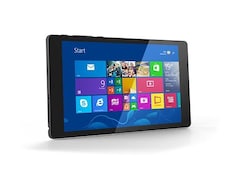- Home
- Tablets
- Tablet Finder
- Archos Tablets
- Archos 80 Cesium
Archos 80 Cesium
- Archos
- Last Updated: 16th February 2026
-
 Display 8.00-inch (1280x800)
Display 8.00-inch (1280x800) -
 Processor Intel
Processor Intel -
 Front Camera 0.3MP
Front Camera 0.3MP -
 RAM 1GB
RAM 1GB -
 OS Windows 8.1
OS Windows 8.1 -
 Storage 16GB
Storage 16GB -
 Rear Camera 2MP
Rear Camera 2MP -
 Battery Capacity 4000mAh
Battery Capacity 4000mAh
Archos 80 Cesium Summary
Archos 80 Cesium tablet was launched in August 2014. The tablet comes with a 8.00-inch display offering a resolution of 1280x800 pixels at a pixel density of 189 pixels per inch (ppi). Archos 80 Cesium is powered by a 1.8GHz quad-core Intel processor. It comes with 1GB of RAM. The Archos 80 Cesium runs Windows 8.1 and is powered by a 4000mAh non-removable battery.
As far as the cameras are concerned, the Archos 80 Cesium on the rear packs 2-megapixel camera. It sports a 0.3-megapixel camera on the front for selfies.
Archos 80 Cesium is based on Windows 8.1 and packs 16GB of inbuilt storage that can be expanded via microSD card (up to 128GB). The Archos 80 Cesium measures 123.00 x 215.00 x 8.60mm (height x width x thickness) and weighs 360.00 grams.
Connectivity options on the Archos 80 Cesium include Wi-Fi. Sensors on the tablet include accelerometer, ambient light sensor, and proximity sensor.
As of 16th February 2026, Archos 80 Cesium price in India starts at Rs. 8,999.
Recommended Alternative
Archos 80 Cesium Full Specifications
| Brand | Archos |
| Model | 80 Cesium |
| Price in India | ₹8,999 |
| Release date | August 2014 |
| Dimensions (mm) | 123.00 x 215.00 x 8.60 |
| Weight (g) | 360.00 |
| Battery capacity (mAh) | 4000 |
| Removable battery | No |
| Screen size (inches) | 8.00 |
| Touchscreen | No |
| Resolution | 1280x800 pixels |
| Pixels per inch (PPI) | 189 |
| Processor | 1.8GHz quad-core |
| Processor make | Intel |
| RAM | 1GB |
| Internal storage | 16GB |
| Expandable storage | Yes |
| Expandable storage type | microSD |
| Expandable storage up to (GB) | 128 |
| Rear camera | 2-megapixel |
| Front camera | 0.3-megapixel |
| Operating system | Windows 8.1 |
| Wi-Fi | Yes |
| GPS | No |
| Bluetooth | Yes |
| NFC | No |
| Infrared | No |
| USB OTG | No |
| Headphones | 3.5mm |
| FM | No |
| Wi-Fi Direct | No |
| Mobile High-Definition Link (MHL) | No |
| Compass/ Magnetometer | No |
| Proximity sensor | Yes |
| Accelerometer | Yes |
| Ambient light sensor | Yes |
| Gyroscope | No |
| Barometer | No |
| Temperature sensor | No |
Archos 80 Cesium Competitors
-
 Archos 80 Cesium
Archos 80 Cesium
Archos 80 Cesium User Review and Ratings
Archos 80 Cesium News
Other Archos Tablets
Related Tablet Tablets
- Samsung Galaxy Unpacked 2026
- iPhone 17 Pro Max
- ChatGPT
- iOS 26
- Laptop Under 50000
- Smartwatch Under 10000
- Apple Vision Pro
- Oneplus 12
- OnePlus Nord CE 3 Lite 5G
- iPhone 13
- Xiaomi 14 Pro
- Oppo Find N3
- Tecno Spark Go (2023)
- Realme V30
- Best Phones Under 25000
- Samsung Galaxy S24 Series
- Cryptocurrency
- iQoo 12
- Samsung Galaxy S24 Ultra
- Giottus
- Samsung Galaxy Z Flip 5
- Apple 'Scary Fast'
- Housefull 5
- GoPro Hero 12 Black Review
- Invincible Season 2
- JioGlass
- HD Ready TV
- Latest Mobile Phones
- Compare Phones
- Tecno Pova Curve 2 5G
- Lava Yuva Star 3
- Honor X6d
- OPPO K14x 5G
- Samsung Galaxy F70e 5G
- iQOO 15 Ultra
- OPPO A6v 5G
- OPPO A6i+ 5G
- Asus Vivobook 16 (M1605NAQ)
- Asus Vivobook 15 (2026)
- Brave Ark 2-in-1
- Black Shark Gaming Tablet
- boAt Chrome Iris
- HMD Watch P1
- Haier H5E Series
- Acerpure Nitro Z Series 100-inch QLED TV
- Asus ROG Ally
- Nintendo Switch Lite
- Haier 1.6 Ton 5 Star Inverter Split AC (HSU19G-MZAID5BN-INV)
- Haier 1.6 Ton 5 Star Inverter Split AC (HSU19G-MZAIM5BN-INV)



















































